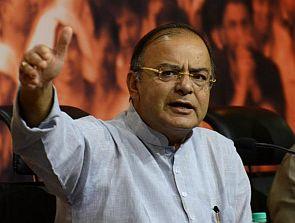 The long-delayed Goods and Service Tax Bill was taken up for consideration in the Lok Sabha on Tuesday after the Speaker rejected Opposition demands to refer the key reform measure to a parliamentary Standing Committee.
The long-delayed Goods and Service Tax Bill was taken up for consideration in the Lok Sabha on Tuesday after the Speaker rejected Opposition demands to refer the key reform measure to a parliamentary Standing Committee.
In the over half-and-hour procedural wrangle, Opposition members insisted that the 122nd Constitutional Amendment Bill be referred to the Standing Committee on Finance as it was a new bill as opposed to the one brought by the United Progressive Alliance government.
Members of Congress, Biju Janata Dal, All India Anna Dravida Munnetra Kazhagam and Communist Party of India-Marxist slammed the government for ‘bypassing’ Parliamentary Standing Committees by refusing to refer several bills to it.
Finance Minister Arun Jaitley’s argument, which carried the day, was that if the GST Bill was sent back to the panel, it would deny the benefits to the states by another financial year as the deadline of April 1, 2016 will be ‘missed’.
He said the Standing Committee has already deliberated up on the measure for two-and-a-half years and barring a few points, there was a “broad consensus” in the empowered committee of state finance ministers on the provisions of the bill.
Besides, he said, a sort of consensus has emerged between the Centre and the states through the empowered committee of state finance ministers.
Seeking to bring the Opposition on board, he said all Congress-ruled states have supported the bill and Trinamool Congress-ruled West Bengal and BJD-ruled Odisha would be the biggest beneficiaries from day one.
He appealed to the opposition parties to “rise above partisan” considerations as “no purpose will be served” by delaying the passage of the crucial bill as it would be the states which would suffer financially.
Jaitley said after GST, government proposed three more bills on the powers of the Centre and the states. GST Bill is a Constitution amendment bill which has to be ratified by at least 50 per cent of the state legislatures.
Deputy Speaker M Thambidurai, who was in the Chair said B Mahtab had requested Speaker Sumitra Mahajan to send the bill to the standing committee as it was an altogether new measure. He said Jaitley had requested the Speaker against referring it to the standing committee and she has accepted the government’s request.
Earlier, B Mahtab (Biju Janata Dal) said the Bill should be referred to the Parliamentary Standing Committee as it was an altogether new bill as opposed to the one brought by the United Progressive Alliance government. He said the Company Laws Amendment Bill was sent to the parliamentary panel twice.
Claiming that the Department related Parliamentary Standing Committees were ‘losing their relevance’, he said out of 51 bills brought by the present government, 44 were not referred to the panels for closer scrutiny.
He said the present practice was sending ‘wrong signals’ that the standing committees are not required anymore.
Mahtab said while bills are sent to Rajya Sabha Select Committees, they are given limited time to examine the proposal.
The BJD member suggested that the finance ministry-related standing committee can be asked to complete its report by first week of July so that it can be cleared by Parliament in the Monsoon session.
Congress leader Mallikarjun Kharge said when the Bharatiya Janata Party was in opposition, it used to plead for sending the bills to the standing committees. He said crucial bills such as Lokpal and Criminal Law (Amendment) Bill were referred to panels for scrutiny though they were of urgent importance to the government.
Kharge said the ‘dictatorial way and the Ordinance Raj’ was not correct as the government was ‘bypassing’ business transaction rules of the Lower House.
P Venugopal (All India Dravida Munetra Kazhagam) said his party opposes the measure as it has several contradictions and was ‘harmful’ to states such as Tamil Nadu.
P Karunakaran (Communist Party of India-Marxist) said he supported the bill but demanded that it be sent to the standing committee.Earlier, N K Premchandran (Revolutionary Socialist Party) said the constitutional validity of the bill was under question as its Clause 21 said the President had powers to remove difficulties in implementing the law.
He said the Presidential powers were used during Emergency through the 42nd Constitution Amendment. It was later nullified by 44th Constitution Amendment brought in 1978.
Jaitley said the provision was part of almost all the bills and power to the President to remove difficulties was limited as he works on the aid and advice of the council of ministers.
He said power to remove difficulties does not mean power to amend the Constitution which is the sole prerogative of Parliament.
The Chair later ruled that examining the constitutional validity was the prerogative of the courts and Speaker cannot rule in this regard.










 © 2025
© 2025